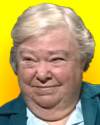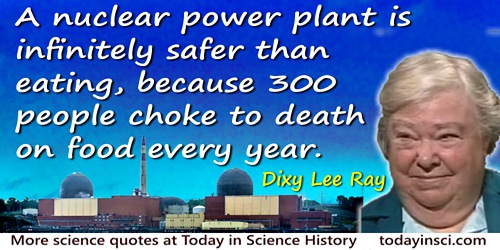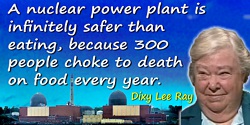 (source)
(source)
|
Dixy Lee Ray
(3 Sep 1914 - 2 Jan 1994)
American marine biologist who was the first female chair (1973-75) of the Atomic Energy Commission and supported nuclear power.
|
Science Quotes by Dixy Lee Ray (13 quotes)
A nuclear power plant is infinitely safer than eating, because 300 people choke to death on food every year. (1977)
— Dixy Lee Ray
Quoted in G. Barry Golson (ed.) The Playboy Interview (1981).
Anything that the private sector can do, the government can do worse.
— Dixy Lee Ray
In Raymond Mungo, 'Dixy Lee Ray: How Madame Nuke Took Over Washington', Mother Jones (May 1977), 2, No. 4, 31.
Calm reason and alarmist environmentalism do not co-exist.
— Dixy Lee Ray
In Trashing the Planet: How Science Can Help Us Deal With Acid Rain, Depletion of the Ozone, and the Soviet Threat Among Other Things (1990), 7.
Everybody is exposed to radiation. A little bit more or a little bit less is of no consequence..
— Dixy Lee Ray
Quoted in 'Dixy Lee Ray, 79, Ex-Governor; Led Atomic Energy Commission' obituary, New York Times (3 Jan 1994).
I think we are living in a new time. I think that the ways of working when there was not the current widespread questioning of what science does are no longer applicable. Besides, there is a difference between the sort of research you do when you’re developing something for the first time and the sort of thing you have to do to make sure it continues to work—and the two different sorts of research are done best by different sorts of people. And, just as with basic science, one needs confirmatory experiments. One can’t just have one group saying “yes they’re safe, yes they’re safe, take our word for it, we made them and we know they’re safe”. Someone else, quite independent, needs to take a look, do the confirmatory experiment. Duplication in this case can do nothing but good.
— Dixy Lee Ray
From interview with Graham Chedd, 'The Lady Gets Her Way', New Scientist (5 Jul 1973), 59, No. 853, 16.
If our tongues were as sensitive as these radiation detectors, we could easily taste one drop of vermouth in five carloads of gin.
— Dixy Lee Ray
Quoted in Esther Stineman, American Political Women (1980).
Nature did not make me willowy.
— Dixy Lee Ray
Quoted in 'Defeat for Dixy Lee Ray', Time (29 Sep 1980).
The first atomic warhead I saw was … like a piece of beautiful sculpture, a work of the highest level of technological skill. It’s the point of a spear.
— Dixy Lee Ray
In Raymond Mungo, 'Dixy Lee Ray: How Madame Nuke Took Over Washington', Mother Jones (May 1977), 2, No. 4, 40.
The general public has long been divided into two parts those who think science can do anything, and those who are afraid it will.
— Dixy Lee Ray
From interview with Graham Chedd, 'The Lady Gets Her Way', New Scientist (5 Jul 1973), 59, No. 853, 15-16.
We can learn a lot from living organisms. An organism is a pretty complicated thing, which can tolerate surgery, which can tolerate injury, which can tolerate all kinds of perturbation provided they are not too great and do not come too suddenly. There’s something we call trauma, however. We don’t really understand what it is—but organisations can suffer from it too.
— Dixy Lee Ray
From interview with Graham Chedd, 'The Lady Gets Her Way', New Scientist (5 Jul 1973), 59, No. 853, 16.
We no longer can talk of unearned “rights.” We’ll have to get back to working for “rights” to adequate food, housing, education, opportunity, a place in the sun—and not everybody is going to make the grade. I don’t see this obsession with the lowest strata of humanity, against all natural biologic experience. We must accept that life is unfair.
— Dixy Lee Ray
In Raymond Mungo, 'Dixy Lee Ray: How Madame Nuke Took Over Washington', Mother Jones (May 1977), 2, No. 4, 31.
We should be very jealous of who speaks for science, particularly in our age of rapidly expanding technology. How can the public be educated? I do not know the specifics, but of this I am certain: The public will remain uninformed and uneducated in the sciences until the media professionals decide otherwise. Until they stop quoting charlatans and quacks and until respected scientists speak up.
— Dixy Lee Ray
In article, 'Who Speaks For Science?', Chemical Times and Trends (Jan 1990). As quoted in Jay H. Lehr (ed.), Rational Readings on Environmental Concerns (1992), 730, and cited on p.735.
Whether science is seen as genie or devil, the attitude is wrong. We need to get some sort of perspective, so that people understand science is just one more intellectual tool, one more way of knowing enough things to give society a means of living on Earth.
— Dixy Lee Ray
From interview with Graham Chedd, 'The Lady Gets Her Way', New Scientist (5 Jul 1973), 59, No. 853, 16.
See also:
- 3 Sep - short biography, births, deaths and events on date of Ray's birth.
- Is it true what they say about Dixy?: A biography of Dixy Lee Ray, by Louis R Guzzo. - book suggestion.


 In science it often happens that scientists say, 'You know that's a really good argument; my position is mistaken,' and then they would actually change their minds and you never hear that old view from them again. They really do it. It doesn't happen as often as it should, because scientists are human and change is sometimes painful. But it happens every day. I cannot recall the last time something like that happened in politics or religion.
(1987) --
In science it often happens that scientists say, 'You know that's a really good argument; my position is mistaken,' and then they would actually change their minds and you never hear that old view from them again. They really do it. It doesn't happen as often as it should, because scientists are human and change is sometimes painful. But it happens every day. I cannot recall the last time something like that happened in politics or religion.
(1987) -- 


